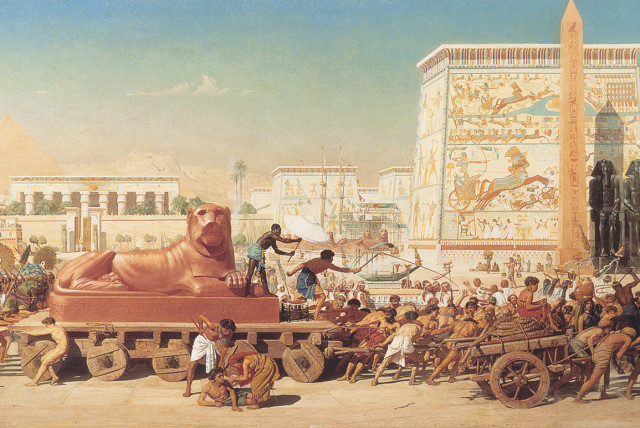Passover 2024: The timeless and timely messages of the Seder - opinion

Part of the secret of this perseverance is the timeless messages of Passover and their ability to inspire new meaning in each generation.
On Monday night, Jews all over the world participated in a Seder, the traditional Passover ceremony and meal commemorating the Israelites’ exodus from Egypt. The Seder is one of the most widely observed traditions across all spectrums of Jewish populations. In Israel, 97% of Jews participate in a Seder, including 93% of those identifying as completely secular. In the US, 62% of Jews participate, which compares to 46% who fast on Yom Kippur. What is it about the Seder that attracts such high rates of participation?
Even though the Israelites left Egypt more than 3,000 years ago, the celebration of freedom continues to inspire. The Jewish nation had been enslaved and oppressed in Egypt for centuries. Their departure from Egypt replaced their suffering with autonomy, among the most basic requirements for personal and national fulfillment.
The Jewish experience as slaves also shaped the nation’s culture and practices through today. Repeatedly, the Torah recalls the Israelites’ experience in Egypt when commanding them to act with kindness to others, especially the disadvantaged. “And you shall not oppress a stranger, for you know the feelings of the stranger, since you were strangers in the land of Egypt,” reads Exodus 23:9, as but one example. Today’s Jewish advocacy for equality and justice traces its roots back to the nation’s enslavement in ancient Egypt.
How does the Seder stay relevant?
Aside from the Seder’s timeless values that have resonated for millennia, the magic of the Seder’s persistence is its ability to communicate messages that stay freshly relevant even as the particulars of Jewish existence change in each generation. “In each generation,” Jews recite at the Seder, “a person is obligated to see themselves as if they came out of Egypt.” This year, two parts of the Seder will stand out for their poignancy and timeliness.
One is the text of vehi she’amda, recited and often sung at the Seder. It reads in translation, “And it is this that has stood by our ancestors and by us: for not only one has risen against us to destroy us, but in each generation there are those that rise against us to destroy us, and the Holy One rescues us from their hands.”
From Egyptian slavery to the Assyrian, Babylonian, and Roman exiles, to the near annihilation of the Jews in Persia as told in the Book of Esther, to the Crusades and the Inquisition, to the pogroms and the Holocaust, to Iran, Hamas, and Hezbollah today, Jewish history has been the prophecy of vehi she’amda on loop playback. With Israel now once again fighting for its existence, no doubt many tears will flow as this passage is reached at Seders this year.
THE SEDER is traditionally conducted over a cup of wine (four cups actually, which may be another reason for the night’s popularity). In addition to vehi she’amda, a second Seder ritual that will stand out for its relevance this year is the removal of drops of wine from participants’ cups as they recount the 10 plagues that afflicted the Egyptians during the exodus.
As much as Jews raise their cups in celebration of freedom, those cups of joy are diminished – literally and symbolically – by the suffering that the Egyptians, the Israelites’ very tormentors, were subjected to during the plagues. “When your enemy falls, do not rejoice,” reads Proverbs.
The Torah sees war, and even capital punishment, as sometimes necessary, but celebrating the downfall of any human is not a Jewish value. This remains the dominant view of Jewish communities today. Israel was given no choice but to fight for its existence against Hamas, but is not rejoicing at the unspeakable suffering Hamas deliberately brings upon the people of Gaza with whom Israel has been seeking peace for decades.
Sure, there are individuals with fringe views, and much of the media is hellbent on painting Israel as the devil. But when you listen to the prayers from synagogue pulpits and the talk at Sabbath meals, it centers around hopes for peace and the return of the hostages. Even as anti-Israel protesters scream, “Death to Israel,” the Jewish demonstrators respond only, “Bring them home” (referring to the hostages) and, “Am Yisrael chai” (Hebrew for “the nation of Israel lives”).
Indeed, despite thousands of years of exile and persecution, the nation of Israel lives. Part of the secret of this perseverance is the timeless messages of Passover and their ability to inspire new meaning in each generation.
The writer is the chief investment officer of Geshem Partners, an Israel-focused investment firm.
Jerusalem Post Store
`; document.getElementById("linkPremium").innerHTML = cont; var divWithLink = document.getElementById("premium-link"); if (divWithLink !== null && divWithLink !== 'undefined') { divWithLink.style.border = "solid 1px #cb0f3e"; divWithLink.style.textAlign = "center"; divWithLink.style.marginBottom = "15px"; divWithLink.style.marginTop = "15px"; divWithLink.style.width = "100%"; divWithLink.style.backgroundColor = "#122952"; divWithLink.style.color = "#ffffff"; divWithLink.style.lineHeight = "1.5"; } } (function (v, i) { });

